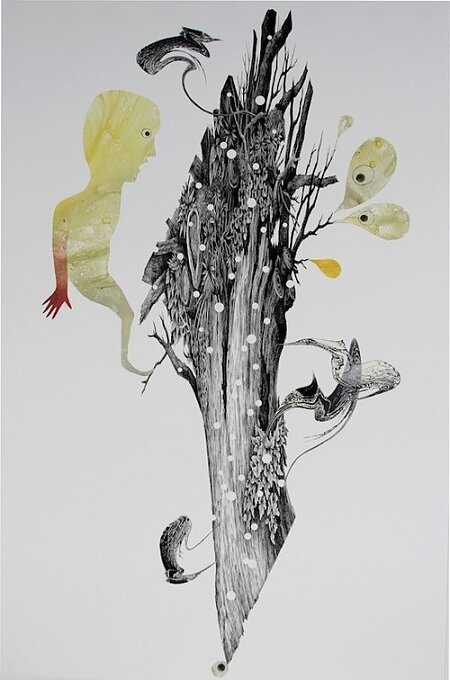
The Lion
Images of Yenderia as a child came to Zungvilda’s mind. Dark, shapeless forms in her hands: the rocks. She would stack them as high as she could, watch them fall, stack them again—methodically, with a persistence neither of the parents recognized as their own. She was their daughter, but she was also something more. Sometimes, instead of stacking rocks in one pile, she would form several small bundles, following a logic accessible only to her. Zungvilda recalled her as a baby, a toddler, a small child. Self-sufficient, even at an early age. How was it conceivable that this beautiful young girl should be sacrificed? And for what?
Everyone knew resisting the Elders was futile. But why? How many Elders were there? What were their weaknesses? Few dared to discuss these topics. If they did, one of the neighbors would report them. They were never seen again. Zungvilda didn’t remember being upset at the Elders until today.
“Greetings, mother.” Yenderia’s voice interrupted her thoughts. The girl stood listlessly, her body barely beginning to show a woman’s shapes.
“Greetings, child!”
They hugged. Yenderia’s confused, introspective look made it clear that she had been told.
“We must find a way to hide you. We’ll probably have to run. Your father will think of something.”
“Don’t you agree that I should rejoice and accept my destiny?” Yenderia’s face became stern, combative.
A shiver of horror and disbelief ran down Zungvilda’s body. This child was resigned to what was supposed to happen. How could she give herself up so easily? How could all those other girls before her? Is this what Zungvilda herself would have done all those years ago?
“No, I don’t agree. I really don't.”
Other children walked past them, not looking. They all knew. Everyone must have known. Were they jealous, scornful, relieved?
The two didn’t speak on their way home. The yellow sand with bits of black rock was soft under their feet.
“Mother, do you know what exactly they will do to me?” Yenderia asked after a long silence.
“I don’t know, child. We won’t let it get to that.” The stress, the sorrow, hardened Zungvilda’s expression. The street was sad, all huts nearly identical, made of clay. The villagers couldn’t afford the beautiful black stone they worked so hard digging for.
“Yes, we will.” Yenderia’s voice was firm, her face too resolute. She was fighting tears. “We don’t have any choice. This is a noble fate. I was chosen. I just want to know what will happen to me.”
“I don’t know. I don’t know. Why do you say we have no choice?”
“Because we don’t.”
*
Time seemed stuck in its own dark glue. They didn’t speak much. Goombeldt arrived. He examined their faces, as if trying to guess whether they had found a way out. From that look, Zungvilda knew that he had not thought of one. She wasn’t surprised. Life was as it was. Few choices were available.
“What are we going to do?” Goombeldt seemed edgy, empty without his usual smile, his kind confidence.
“Nothing,” Yenderia said. “We have to accept the inevitable. Everyone has her own role to play in life.”
“Child, do you really like this role?” Zungvilda’s mind was muddled; she wasn’t sure how to say what she felt, how to change her daughter’s mind.
“The Elders teach that the girls who accept their fate become angels.”
“How can they know?” Goombeldt sat at the table, staring at, but seeming not to notice, the bowl of stew Zungvilda had placed before him. She sat down opposite, and now the three of them were at the table like every evening. But the mood hung darkly over the small room.
“What are we going to do?” Zungvilda’s voice cracked, tears sparkled in her eyes.
“We wait until dark.” Goombeldt seemed to be doing his best to appear inspired, optimistic, but his needlessly gesturing hands betrayed uncertainty. They folded on his chest, fell flatly on the table, fingers tapping small, unfinished rhythms. “Then we get on walking. We bring water, some food. In ten days, we will be in the next town.”
“Impossible,” Yenderia argued. “We will all die in the desert. How will we know we’re headed in the right direction? Only seasoned caravan leaders take this risk. And what makes you think the Elders will not come after us?”
“You sound like you don’t mind being sacrificed,” Zungvilda cried.
“My death will support the Balance.” Yenderia was pale, defiant, beautiful. She was no longer a child, but still a part of them, a part that was being removed.
“Why does the Balance even need this kind of support?” As she was saying this, Zungvilda realized that this was the first time she had ever questioned the Balance.
“The power of the Balance is measured through sacrifice,” Yenderia replied with borrowed words.
Zungvilda’s mind was filled with images of her daughter’s younger years. Yenderia in the sand, on a donkey’s back, in her small bed. They were prepared to cross the desert and perhaps die trying to save her, but she did not want to be saved. She no longer belonged to the family, she belonged to the Elders. They all did.
